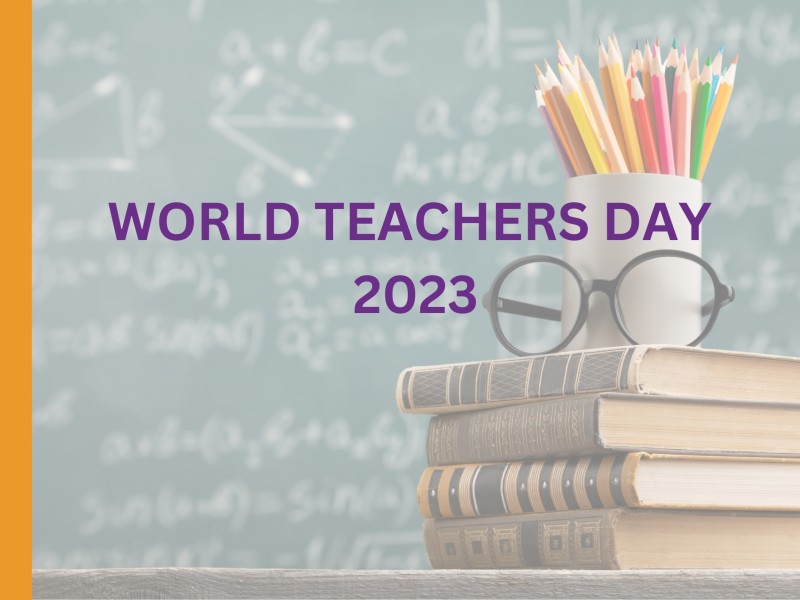GCE Statement on the Occasion of the 2023 World Teachers’ Day

GCE Statement on the Occasion of the 2023 World Teachers’ Day
“The teachers we need for the education we want: The global imperative to reverse teacher shortage”
The Global Campaign for Education invites all members of society to acknowledge the fundamental role played by teachers in the provision of education for all and more broadly for their contribution to positively transforming our societies.
Although teachers are one of the most influential actors needed to achieve SDG4 and make the human right to education a reality, the issues of teacher’s training, fair and competitive remuneration, quality terms and conditions, social recognition and their standard of living are often undermined in education and social policies. Therefore, besides an opportunity to thank teachers for their contribution to our societies, today is an opportunity to highlight some of the many critical challenges that teachers in all corners of the world, especially in countries of the global south, face to deliver their profession with dignity and respect.
GCE observes with concern the low remuneration of the teaching profession in many countries that leaves many teachers living below the poverty line. It should be also a concern for all of us that rather than comprehensive policies to improve the working and living conditions of teachers, austerity policies imposed by the World Bank and the International Monetary Fund are undermining them. Indeed, it should be a source of concern for all members of the education community, including students, parents and more fundamentally governments and international institutions the fact that many teachers are living on less than one dollar per day.
Debt crises notably, but not only, in low and middle-income countries are compromising the hiring and training of the teachers required to secure quality education for all. Rather than investing in providing teachers with the skills and training they need to deliver high-quality education to all students to reach their potential, countries facing debt distress are paying interest that further compromises the fulfilment of everyone’s right to education.
GCE calls for governments and the international community as a whole, notably the World Bank and the International Monetary Fund to acknowledge the negative impacts of abusive bilateral and multilateral credits on the right to education and adopt a comprehensive policy to either alleviate or cancel the debt in those countries.
Along with the above-mentioned austerity policies, debt crises are limiting the possibility for countries to hire new teachers and are therefore making the teachers’ gap even more acute[1]. The lack of teachers compromises the quality of education and teachers’ working conditions. This includes overcrowded classrooms, exhaustion, and lack of motivation amongst students and teachers, all of which have a negative impact on students’ learning outcomes[2].
GCE is particularly concerned about the difficult situation faced by teachers in conflict affected and post-conflict areas in which their lives are often at risk and call on all state and non-state actors to respect the lives of teachers and in line with international humanitarian law and acknowledge and respect their right to remain neutral. In the period 2020/2021 Education Cannot Wait reported over 630 attacks on students, teachers, and other education personnel. In these attacks, over 2,400 students or education staff were reportedly injured, killed, abducted, or threatened, and around 2,300 were reportedly arrested or detained.
Furthermore, teachers face significant challenges in contexts of climate change, disaster, and conflict-related emergencies. Teaching students who have first-hand experience of the destruction of their houses and schools due to natural disasters or conflict requires special training and dedicated support for them to be able to support children and youth dealing with mental distress.
The conditions of teachers working in emergencies, notably in refugee settings, is a special source of concern for the GCE movement. They often face more unequal work conditions and frequently lack teaching qualifications and opportunities for professional development. Teachers with refugee backgrounds face additional inequalities. They are often not included in national planning and resources are not allocated to hire them and improve their working and living conditions.
GCE encourages all governments and the international community to protect the lives of teachers, to acknowledge their unparalleled contribution to our education systems and societies, and to increase investment in quality public education systems. Only with material and social recognition of the role of teachers’ and sustainable financing can societies guarantee their labour rights and working conditions and make progress towards SDG4.
[1] By 2016, the World Bank estimated the global teacher shortage at 69 million. World Bank, World Development Report 2018: Learning to Realise Education’s Promise, 2018.
[2] See Okeke, C. I., & Mtyuda, P. N. (2017). Teacher job dissatisfaction: Implications for teacher sustainability and social transformation. Journal of Teacher Education for Sustainability, 19(1), 54-68; Goldhaber, D., Lavery, L., & Theobald, R. (2015). Uneven playing field? Assessing the teacher quality gap between advantaged and disadvantaged students. Educational researcher, 44(5), 293-307.


